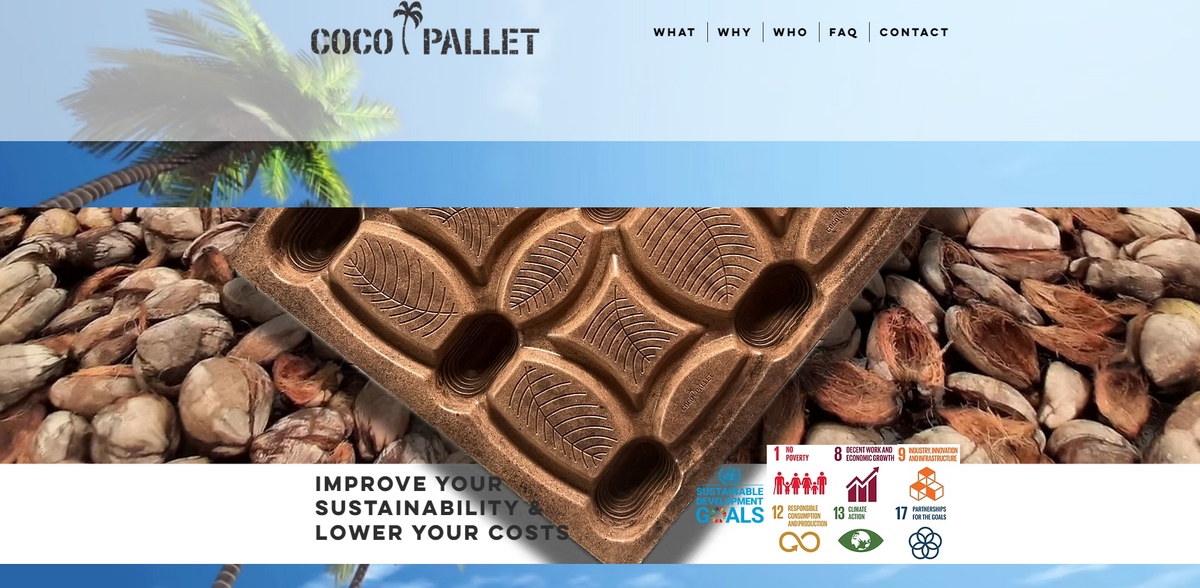What is CocoPallet?
CocoPallet is an innovative project that improves sustainability and lowers costs by converting coconut husk waste into fully circular, bio-based, and 100% wood free export pallets. These pallets are ISPM15 compliant and represent a breakthrough solution in the realm of sustainable export logistics. CocoPallet turns waste2value – taking what is normally discarded, such as coconut husks that are burned or landfilled, and transforming it into a cost-effective, circular product. The project is designed to provide an affordable and scalable alternative to traditional one-way wooden pallets. It uses the natural material from coconut husks in a process that not only keeps precious resources intact but also supports the environment by reducing deforestation and waste.
Main Benefits and Key Figures
A range of striking facts and figures underline the impact of the CocoPallet approach:
- 170 million trees per year are used to produce one-way wooden pallets – a figure that highlights the substantial resource savings offered by switching to CocoPallet technology.
- 85% of coconut husks are currently landfilled, flushed, or burned, illustrating an enormous opportunity to repurpose what is typically wasted.
- CocoPallets not only provide an environmentally friendly alternative but also generate extra income for coconut farmers by purchasing the otherwise discarded husk waste.
- At the end-of-life stage, CocoPallets can be milled and used as a valuable soil improver, replacing conventional peat moss in a fully circular way.
- The project contributes significantly to reducing deforestation, minimizing waste, and lessening poverty in agricultural communities.
Sustainability and Circular Economy
Embodying the principles of a circular economy, CocoPallet emphasizes sustainability on every level. The process utilizes coconut husk waste to create a product that is not only renewable and natural but also completely biodegradable. This approach minimizes the ecological footprint by diverting waste from landfills and reducing the need for timber from forests. In a world where 170 million trees are lost each year to the production of disposable wooden pallets, the CocoPallet project offers a breath of fresh air by presenting a solution that is both eco-friendly and economically viable. The project’s operational model translates into lower costs for shipping multinationals while simultaneously providing a greener alternative that can be adopted at scale.
Innovation in Design and Material
One of the most remarkable aspects of the CocoPallet project is its biomimicry-inspired design. The design process draws from the clever ways in which nature constructs shapes and surfaces to create products that are both lighter and stronger. This natural inspiration manifests in a pallet that is not only high-performing but also resilient under pressure. There is something inherently engaging about a product that learns from nature – it speaks to a modern audience that values both innovation and environmental stewardship. In practical terms, these design enhancements lead to a pallet that can handle the rigors of export logistics while contributing to cost savings and sustainability.
Supporting Stakeholders and Partnerships
The CocoPallet project is built on strong partnerships and a commitment to stakeholder value. Endorsed by respected institutions such as RVO (Netherlands Enterprise Agency), Wageningen University, and the Fraunhofer Institute, CocoPallet’s credibility is solidly backed by research and expertise. A quote from founder Michiel Vos encapsulates the project’s philosophy: “The brilliant thing is that we make sustainability affordable and therefore scalable.” In emphasizing that stakeholders’ value is much more important and logical than only shareholders’ value, the project positions itself as a forward-thinking initiative that cares deeply about communities, the environment, and the long-term wellbeing of the supply chain. Funding these partnerships ensures that innovations and best practices are continuously integrated, forming a robust foundation for future developments.
Meeting Market Demands with Eco-Conscious Solutions
CocoPallet has already attracted attention from several major multinationals eager to reduce their carbon footprint while lowering operational costs. The adoption of these sustainable pallets by leading companies demonstrates the market’s readiness to embrace green technology. It is a dynamic shift—one where cost efficiency and environmental responsibility are no longer seen as mutually exclusive but as mutually reinforcing ambitions. In an era where corporate sustainability is becoming a critical aspect of business success, CocoPallet’s approach is timely and necessary, serving as a model for how industry can drive innovative, eco-conscious solutions that benefit all.
Project Impact and Sustainable Development Goals
- SDG 1 – No Poverty: By paying coconut farmers a fair price and supporting local cooperatives, CocoPallet helps alleviate poverty.
- SDG 12 – Responsible Consumption and Production: The project promotes the effective use of natural resources and minimizes waste.
- SDG 13 – Climate Action: Reducing deforestation and lowering the carbon footprint contributes to a healthier climate.
- SDG 15 – Life on Land: Protecting forests by utilizing coconut husks instead of wood conserves biodiversity and natural habitats.
Future Perspectives and Community Impact
Looking ahead, the CocoPallet project represents a significant leap forward in sustainable logistics, offering a practical solution that supports both the economy and the environment. This initiative not only addresses an immediate need—providing alternatives to wood-based pallets—but also lays the groundwork for long-term community and environmental benefits. The innovation behind CocoPallet speaks volumes about future possibilities. The repurposing of agricultural waste ensures that resources are used efficiently while also fostering innovation in materials science and design. Such forward-thinking applications of biomimicry inspire both industry experts and community members alike to envision a future where sustainability is the norm rather than the exception. In embracing natural design principles and supporting stakeholders across the supply chain, CocoPallet sets a shining example for how responsible business practices can lead to vibrant, resilient economies and greener communities.


















